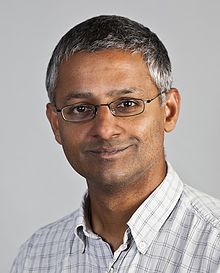Shankar Balasubramanian
| Sir Shankar Balasubramanian | |
|---|---|

Shankar Balasubramanian, Herchel Smith Professor of Medicinal Chemistry
|
|
| Born |
30 September 1966 Madras, Madras State (now Chennai, Tamil Nadu), India |
| Residence | UK |
| Nationality |
|
| Institutions | |
| Alma mater | University Cambridge (MSci, PhD) |
| Thesis | Studies on the reaction mechanism of chorismate synthase (1992) |
| Doctoral advisor | Chris Abell |
| Doctoral students | Julian Huppert |
| Known for |
|
| Notable awards |
|
|
Website www |
|
Sir Shankar Balasubramanian FRS (born 30 September 1966) is an Indian-born British chemist and Herchel Smith Professor of Medicinal Chemistry in the Department of Chemistry the University of Cambridge, Senior Group Leader at the Cancer Research UK Cambridge Institute and Fellow of Trinity College, Cambridge. He is recognised for his contributions in the field of nucleic acids. He is scientific founder of Solexa and Cambridge Epigenetix.
Born in Madras (now Chennai) India in 1966, Shankar Balasubramanian moved to the UK with his parents in 1967. He grew up in a rural area just outside Runcorn in Cheshire and attended Daresbury Primary School, then Appleton Hall High School (which has since amalgamated to form Bridgewater High School). He then went on to study at Fitzwilliam College, Cambridge, where he did his undergraduate degree in Natural Sciences (1985–88) and continued with a PhD for research on the Reaction mechanism of the enzyme Chorismate synthase supervised by Chris Abell (1988-1991).
Following his PhD, Balasubramanian travelled to the USA as a SERC/NATO Research Fellow and worked in the group of Professor Steven J Benkovic at Pennsylvania State University (1991-1993). He started his independent academic career in 1994 in the University of Cambridge and has remained there ever since, first as College Lecturer, then University Lecturer (1998), University Reader in Chemical Biology (2003) and Professor of Chemical Biology (2007). He was most recently appointed Herchel Smith Professor of Medicinal Chemistry in 2008. He currently directs research laboratories in the Department of Chemistry and also the CRUK Cambridge Institute at the Cambridge Biomedical Campus.
...
Wikipedia
